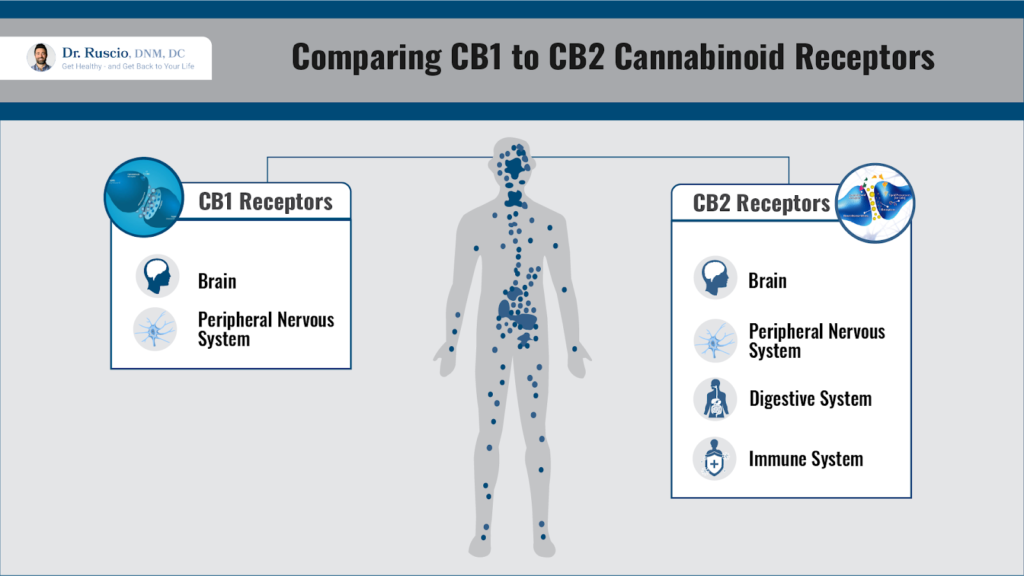What You Need to Know About Using CBD for IBS
The Curious Role of the Endocannabinoid System in Gut Health
- What Is CBD?|
- Endocannabinoid System|
- CBD for IBS|
- Does CBD Help IBS?|
- Using CBD for IBS|
- Safety & Side Effects|
- Probiotics and Endocannabinoids|
- The Bottom Line|
With the increasing legalization of cannabis and its by-products in the United States, CBD oil — otherwise known as cannabidiol — is everywhere. You can find it in gas stations, grocery stores, as well as in specialty boutiques and cannabis dispensaries, and it’s recommended for a wide range of health concerns.
One of the things CBD is recommended for is Irritable Bowel Syndrome (IBS). Some early research suggests that CBD may be able to influence your gut inflammation, motility, and even your gut microbiome. Is CBD for IBS a valid treatment option?
Currently, there is almost no direct research suggesting that CBD can improve IBS symptoms.
Let’s explore what CBD is, what we know about the effects of CBD for IBS and the digestive system, and what we know and don’t know about how it may treat Irritable Bowel Syndrome (IBS) or other digestive conditions.

What Is CBD?
Cannabidiol (CBD) is one of many cannabinoids, which are cannabis plant compounds produced by Cannabis sativa and hemp plants. CBD is non-intoxicating and non-psychoactive. CBD’s more famous cousin, THC (tetrahydrocannabinol), is the cannabinoid responsible for the well-known psychoactive effects of smoking or consuming cannabis.
Companies that sell CBD products promote it to help remedy a wide range of health concerns, such as chronic pain [1], headaches, joint pain, appetite, sleep, and digestive complaints like IBS.
CBD appears to be able to act as a pain reliever and has anti-inflammatory properties several hundred times stronger than aspirin [2]. However, there is a tendency to generalize claims about full-spectrum cannabis — extracts of whole cannabis — and CBD alone. To more fully explain, we need to dive into the specifics of the endocannabinoid system.
Endocannabinoid System 101
It may surprise you to learn that the human body creates its own cannabinoids and has a vast network of cannabinoid receptors.
This means your body is wired to benefit from cannabinoids. This endocannabinoid system (ECS) plays an important role in the development, balancing, and resilience of your central nervous system and immune system [3, 4].
There are two main types of cannabinoid receptors: CB1, and CB2. CB1 receptors are concentrated primarily in your brain and peripheral nervous system, while CB2 receptors are located not only in your brain and nervous system but also in your digestive and immune systems [5]. CBD can bind to either type of cannabinoid receptor.

Some researchers have proposed that endocannabinoid deficiency may influence gut conditions like IBS, pain conditions, such as fibromyalgia and migraines [6], as well as autoimmune diseases [7]. Endogenous cannabinoids (meaning those produced by your body), like anandamide, are thought to influence pain perception and gut motility (the movement of waste through your digestive tract) [8]. For this reason, many people are excited about the potential of cannabinoids like CBD to help chronic pain, opioid addiction, and IBS symptoms like bloating, constipation, and hypersensitivity [9].
CBD for IBS (Irritable Bowel Syndrome)
Irritable bowel syndrome (IBS) is a common digestive tract disorder. Frequent digestive systemsymptoms of IBS include [10]:
- Abdominal pain or cramping
- Bloating
- Gas
- Diarrhea or loose stool (IBS-D), or constipation (IBS-C)
- Food sensitivities
The root causes of IBS vary widely, from bacterial overgrowth to nervous system imbalances that affect gut motility. Because of this, treating IBS requires a multi-faceted approach.
Many people with other digestive conditions — such as Inflammatory Bowel Diseases like Crohn’s disease and ulcerative colitis — also have IBS symptoms.
Does CBD Help IBS?

There is not yet clear evidence that CBD can help IBS symptoms, despite some interesting preliminary results and hopeful theories.
In the end, dietary changes such as a low FODMAP diet [11, 12], probiotics [13, 14], or lifestyle changes like practicing meditation [15] have proven and documented benefits for IBS where you don’t have to wait for further research. So, while we explore the research so far about CBD and IBS, please don’t ignore more proven approaches.
Multiple literature reviews suggest that targeting the endocannabinoid system with CBD or other cannabinoids may provide some benefit for IBS patients and their symptom flare-ups, as well as patients with other gastrointestinal disorders such as inflammatory bowel disease (IBD) [16, 17, 18].
However, there is little direct clinical evidence to suggest you are likely to benefit from CBD if you have IBS symptoms..
Here is a summary of the evidence that suggests CBD may be beneficial for IBS symptoms:
- In a large observational study, CBD was associated with reduced gut and non-specified pain [19].
- One small study concluded that a combination of CBD and PEA (also an endocannabinoid) reduced leaky gut and intestinal inflammation in humans [20].
- A study determined that CBD improved the perceptions of disease activity and quality of life in patients with ulcerative colitis [21].
- A systematic review of mouse studies suggested CBD could be valuable for treating ulcerative colitis [22].
- Animal model studies, mostly in mice, suggest that CBD can reduce gut tension and contractions [23], normalize both slow and fast gut motility [24], and positively affect nerve channels that regulate gut motility and secretion [25].
- A systematic review and meta-analysis of 51 animal studies found that cannabinoid drugs, CBD in particular, are beneficial in treating mouse models of colitis [26].
Out of all these studies, only two are placebo-controlled clinical trials. The rest are lower quality observational, or animal studies, which may or may not have relevance for humans, and none of them specifically studied IBS. So even though these are positive findings, they are not a clear endorsement of CBD.
Add to that the following study results, which don’t support using CBD for IBS symptoms:
- A 2021 SR/MA of 15 nonrandomized studies and 5 RCTs concluded that cannabinoids do not induce clinical remission or affect inflammation in IBD patients (although there may be some improvement in symptoms) [27].
- A 2020 literature review concluded that the bulk of evidence suggesting cannabis as having pain-relieving, anti-inflammatory, and diarrhea-reducing properties for IBD is anecdotal [28]. A systematic review comparing synthetic and non-synthetic cannabinoids to controls for treating Crohn’s disease couldn’t determine if there was any benefit [29].
- Though it certainly warrants more studies, there is virtually no evidence that CBD for IBS is beneficial. CBD should be viewed as a potential but unproven support to be used as a trial. Always start your IBS treatment plan with the most proven therapies (such as a low FODMAP diet and probiotics). If proven therapies haven’t fully resolved your symptoms, a trial of CBD can be considered.
Using CBD for IBS

CBD oil is allowed to be sold throughout the United States as long as the THC content is below 0.3%. People typically consume CBD products orally as an oil, but they can also be consumed as a tincture (a preparation of CBD in alcohol or glycerin) or edible product (like a gummy or baked good).
In states where cannabis is legal, either for medicinal or recreational use, some CBD products may contain varying levels of THC. Some evidence suggests that therapeutic results are better when CBD is given together with other cannabinoids, including THC [30]. This is known as the “entourage effect.” However, not everyone wants the psychoactive side effects of THC. Read your labels carefully, or request help interpreting the information on product labels.
Your ideal dosage will vary widely depending on your body’s needs, the potency of the product, and your tolerance. For best results, consult with a health care provider or medical professional who is knowledgeable about CBD dosing and your medical condition.
CBD Oil Side Effects and Safety
If you want to try CBD for IBS, keep the following considerations in mind.
CBD Side Effects
CBD is often promoted as a safer alternative to medications, but some people do experience side effects.
CBD and other cannabinoids are metabolized in the liver and intestines.
Too much CBD can damage the liver, especially if mixed with other medications, such as leflunomide, lomitapide, mipomersen, pexidartinib, teriflunomide, and valproate [31]. If you are taking these medications or have an existing liver condition, consult a physician before using CBD.
CBD oil consumption can cause possible side effects [32, 33, 34]. These include:
- Drowsiness
- Nausea or vomiting
- Diarrhea [35]
- Fatigue
- Decreased appetite
- A minority of people may have an intolerance to cannabis oil or its carrier oils such as sesame oil.
A systematic review and meta-analysis found that adverse gastrointestinal tract events may be more common when CBD and other cannabis-based medicines are ingested rather than inhaled [36].
CBD Safety
Non-FDA-approved CBD products on the market vary greatly in quality and consistency. This raises two potential issues:
- Without independent laboratory verification, one cannot know whether the dosage of such products is accurate, if the THC content is less than 0.3%, and whether they are unadulterated and uncontaminated [37].
- Companies extract CBD and hemp oil in two main ways: by solvents or by CO2. Some types of solvent extraction are more toxic than others.
Always buy CBD products from manufacturers who are transparent about their production methods, quality-control measures, and potency. Look for independent laboratory verification of product contents.
Probiotics and the Endocannabinoid System
Some very early evidence suggests that the gut microbiome may influence the endocannabinoid system [38].
One clinical study showed that Lactobacillus probiotic supplementation increased the function of cannabinoid and opioid receptors and reduced pain [39]. Dogs with motility problems who were given probiotics showed an increase in cannabinoid receptor action and improved motility [40]. Another study, albeit in mice, suggested that CBD increased the abundance of beneficial gut bacteria but also increased the expression of inflammatory cytokines [41].
We know that probiotics are a clinically effective treatment option for a wide range of digestive complaints [42, 43]. We don’t need to know whether their interaction with the endocannabinoid system is one more reason for their benefits, but it’s an interesting line of research for the future.
The Truth About CBD for IBS
CBD may be popular, but there isn’t yet proof that it helps IBS symptoms. While early data suggest it may play a helpful role in regulating gut motility, reducing gut pain, and supporting the nervous system, much more research is needed.
There are many proven and effective treatments for IBS, and it makes sense to keep your focus on these approaches. However, If you’re CBD curious, try CBD as a short-term trial and don’t expect miracles.
Dr. Michael Ruscio is a DC, natural health provider, researcher, and clinician. He serves as an Adjunct Professor at the University of Bridgeport and has published numerous papers in scientific journals as well as the book Healthy Gut, Healthy You. He also founded the Ruscio Institute of Functional Health, where he helps patients with a wide range of GI conditions and serves as the Head of Research.
Discussion
I care about answering your questions and sharing my knowledge with you. Leave a comment or connect with me on social media asking any health question you may have and I just might incorporate it into our next listener questions podcast episode just for you!